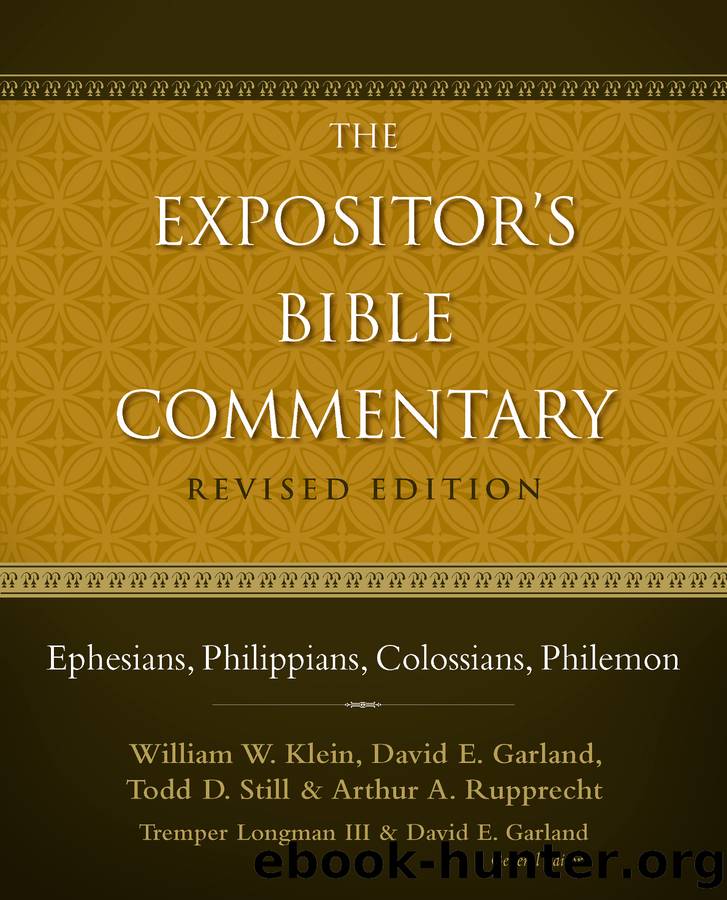Ephesians, Philippians, Colossians, Philemon by unknow

Author:unknow
Language: eng
Format: epub
Tags: REL006070 Religion / Biblical Commentary / New Testament
Publisher: Zondervan
Text and Exposition
I. LETTER OPENING (1:1â11)
A. Greeting (1:1â2)
1Paul and Timothy, servants of Christ Jesus,
To all the saints in Christ Jesus at Philippi, together with the overseers and deacons:
2Grace and peace to you from God our Father and the Lord Jesus Christ.
COMMENTARY
1 Paul adapts and makes distinctively Christian the conventional greetings found in Hellenistic letters: âA to B, greetings,â followed by a wish for good health. He does not extend to the Philippians the friendly good wishes of a private individual but the blessings of âgrace and peaceâ generated by what God has done through Christâs death and resurrection.
He names Timothy as his cosender. Timothy was present at the founding of the Philippian church (Ac 16:1â12) and had been dispatched by Paul on subsequent occasions to strengthen the Macedonian churches (Ac 19:22; 20:3â6), so that they already knew of his irreproachable, Christlike character (Php 2:22). Paul commends him in 1 Thessalonians 3:2 as âour brother and Godâs fellow worker in spreading the gospel of Christâ and praises his devotion to the cause of the gospel (Php 2:19â24).
In the salutations of his three letters to the Macedonian churches (1:1; 1Th 1:1; 2Th 1:1) Paul does not identify himself as an apostle. Here he identifies himself and Timothy as â[bond] servantsâ (douloi, âslaves,â GK 1528) of Christ Jesus. We need not speculate that Paul omitted the title âapostleâ because his relationship with the Philippians was warmer than with other congregations, which made mention of his apostolate unnecessary. Elsewhere in his greetings, he distinguishes his own role from that of his cosender, who is identified only as âour brotherâ (1Co 1:1; 2Co 1:1; Col 1:1; Phm 1). Identifying himself with Timothy as âbond servantsâ is suggestive. The term could be a title of honor, drawing on the OT image of Godâs chosen servants who are his accredited messengers (see Ps 105:42 [Abraham]; Ex 14:31; Nu 12:7; Jos 14:7; Ps 105:26 [Moses]; Ps 89:20 [LXX 88:21; David]; and 2Ki 17:13, 23; Jer 7:25; 25:4; Am 3:7 [the prophets]). The Philippians, however, are more likely to connect the term to slavery, which was ubiquitous in the ancient world. Identifying himself and Timothy as slaves drives home the point that they are not ministry volunteers but are in bondage to Christ, who owns the title deed to their lives.
Since Paul ends his letter with a greeting to the church from those of âCaesarâs householdâ (4:22), he may be making a deliberate if allusive contrast. Those who belong to the household of Caesar are slaves and freedmen (slaves who have been manumitted but who are still legally obligated to their former masters). Their status is embedded in the status of their masters. Slaves who belonged to wealthy, influential families were more powerful and enjoyed greater privileges than many free persons. Belonging to an imperial household would give a slave and a freedperson high status that would make them worthy of special mention in the final greetings. Roman colonists perhaps would have appreciated that fellow believers belonged to the
Download
This site does not store any files on its server. We only index and link to content provided by other sites. Please contact the content providers to delete copyright contents if any and email us, we'll remove relevant links or contents immediately.
It's Never Too Late by Kathie Lee Gifford(620)
The 9.9 Percent by Matthew Stewart(594)
Take Back Your Time by Christy Wright(579)
Hebrews, James by George H. Guthrie & George H. Guthrie(569)
The New Oxford Annotated Bible with Apocrypha by unknow(547)
Israel: Ancient Kingdom or Late Invention? by Daniel I. Block(546)
The Book Every Leader Needs to Read by 48 Authors(539)
Eating the Bible by Rena Rossner(536)
Insights on Hebrews by Charles R. Swindoll(525)
Psalms, Proverbs, Ecclesiastes, and Song of Songs by John W. Hilber & Tremper Longman III & Duane Garrett(509)
The Jew in the Lotus by Rodger Kamenetz(466)
Commentary on the Torah by Richard Elliott Friedman(465)
Judges: Volume Two by unknow(464)
Who Wrote the Bible? by Richard Elliott Friedman(451)
NKJV, Ignite, eBook by Thomas Nelson(436)
Proverbs, Ecclesiastes, Song of Solomon (Ancient Christian Commentary on Scripture) by J. Robert Wright(428)
Commentary on James (Commentary on the New Testament Book #16) by Robert H. Gundry(428)
Job, Ecclesiastes, Song of Songs by August H. Konkel & Tremper Longman III(423)
Reading the Bible with Rabbi Jesus by Tverberg Lois(403)
